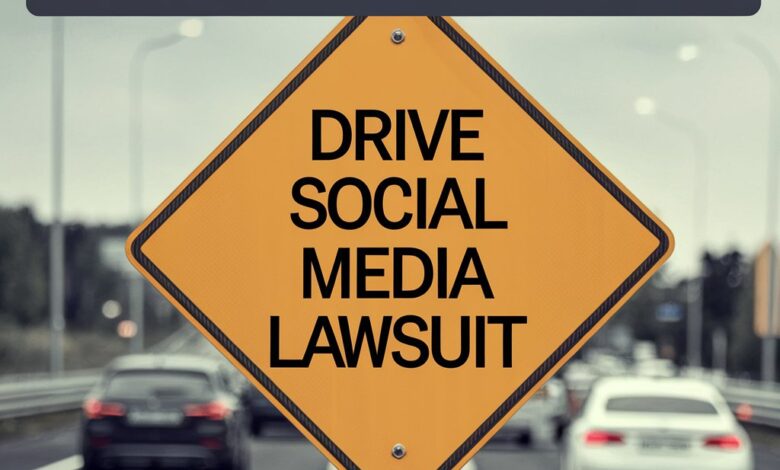Drive Social Media Lawsuit: What You Need to Know

Social media platforms have revolutionized the way we communicate, share ideas, and express opinions. However, with the rise of digital communication, legal challenges have also surged, particularly when it comes to issues of privacy, defamation, and even copyright violations. If you’ve ever wondered about the term “drive social media lawsuit,” you’re not alone. It’s a complex and growing area of law that addresses the intersection of social media use and legal responsibility. Let’s break it down.
Table of Contents
What Does “Drive Social Media Lawsuit” Mean?
In simple terms, a “drive social media lawsuit” refers to the legal actions or cases that arise due to activities on social media platforms. This includes lawsuits where users, companies, or other entities take legal action over harmful actions or content posted on social media. These lawsuits can range from defamation, harassment, intellectual property theft, privacy violations, or even false advertising.
The “drive” aspect often refers to the triggering factors—what pushes individuals or companies to pursue legal action. Whether it’s the sharing of harmful content, misinformation, or an infringement on someone’s rights, these lawsuits are increasingly becoming a critical part of the modern legal landscape.
Why Are Drive Social Media Lawsuits on the Rise?
Several factors contribute to the surge in social media-related lawsuits. First and foremost is the widespread use of platforms like Facebook, Twitter, Instagram, and TikTok. These platforms have billions of users, and with such a vast audience, the likelihood of conflicts rises dramatically. Here are some key reasons behind the increasing number of these lawsuits:
- Amplification of Harm: Social media gives a platform to voices that can easily spread harmful, defamatory, or malicious content. The viral nature of posts makes it difficult to control the damage once a false claim or inappropriate content goes live.
- Anonymity: Many people feel emboldened to engage in harmful behavior online due to the anonymity that social media provides. This can result in actions such as cyberbullying, harassment, or defamation.
- Legal Ambiguities: Social media laws are still developing. While platforms have rules, the laws governing online activity are often unclear or underdeveloped. This creates room for legal gray areas where users and companies don’t fully understand their rights or responsibilities.
- Financial Stakes: Companies are highly protective of their reputations, intellectual property, and brand image. When these are jeopardized by social media activity, they are quick to take legal action to protect their financial interests.
Common Types of Drive Social Media Lawsuits
There are a variety of reasons people or organizations might file a social media lawsuit. Let’s look at the most common ones:
- Defamation and Libel: Defamation refers to the act of damaging someone’s reputation through false statements. Social media platforms provide an outlet for defamatory comments that can go viral, causing lasting harm to individuals or businesses. In these cases, those affected may file lawsuits to seek damages and public correction of the falsehood.
- Invasion of Privacy: Privacy is another critical area where social media lawsuits arise. People may sue if their personal information is shared without consent, or if sensitive details are posted that lead to personal harm or distress.
- Intellectual Property Infringement: Copyright and trademark violations are common on social media, as users may share content they do not own or use trademarks without permission. Businesses or content creators whose intellectual property is stolen may pursue legal action to safeguard their work.
- Cyberbullying and Harassment: Social media harassment has become a serious issue. Victims of online bullying, stalking, or harassment might take legal steps to stop the perpetrator and seek compensation for emotional distress.
- False Advertising: Companies that use social media to advertise their products may face lawsuits if they are accused of misleading consumers or engaging in deceptive marketing practices.
The Role of Social Media Platforms in Lawsuits
While individuals or businesses may file lawsuits against other users, the platforms themselves are also often part of the equation. Social media companies like Facebook, Twitter, and others have their own rules for handling offensive content, but they’re not always quick to act on reports of harmful content.
In some cases, the platform may be named in a lawsuit for failing to take down content in a timely manner or for not enforcing their own community guidelines. This has led to ongoing debates about whether these platforms should be more strictly regulated and accountable for user-generated content.
Legal Protections and Challenges for Social Media Users
The law surrounding social media use is complex, and the level of protection you have can vary depending on where you live. In the United States, Section 230 of the Communications Decency Act offers some protections to social media platforms, shielding them from liability for content posted by users. However, this protection does not extend to illegal activities like harassment, defamation, or fraud.
In other parts of the world, the legal landscape is even more complex. The European Union, for example, has stricter privacy laws, such as the General Data Protection Regulation (GDPR), which can lead to social media lawsuits related to data misuse or breaches.
How to Protect Yourself from a Drive Social Media Lawsuit
Whether you’re a social media user, content creator, or business owner, it’s essential to understand how to protect yourself from legal issues. Here are a few key strategies:
- Understand the Platform’s Terms of Service: Each social media platform has rules that users must follow. Familiarizing yourself with these rules can help you avoid posting content that may lead to legal action.
- Be Mindful of Privacy: Always respect other people’s privacy by avoiding sharing personal information without permission. Be cautious about what you post or share, especially if it involves sensitive or private topics.
- Seek Permission for Shared Content: If you want to use someone else’s content, such as photos or videos, always ask for permission and provide proper credit. This can help prevent intellectual property disputes.
- Use Social Media Responsibly: Avoid engaging in harmful or defamatory behavior. While it’s easy to get caught up in arguments or drama online, these actions can have serious legal consequences.
- Legal Counsel: If you’re unsure whether something you’ve posted or shared could lead to a lawsuit, consulting a lawyer is always a good idea.
Also Read: Abraham Quiros Villalba: A Visionary in Sustainable Innovation
Conclusion: Navigating the Complex World of Drive Social Media Lawsuits
Social media lawsuits have become an unavoidable reality in today’s digital age. As platforms continue to grow in reach and influence, the number of legal challenges will likely increase. By understanding the potential risks and knowing how to protect yourself, you can navigate the digital landscape more safely. Remember, while social media offers incredible opportunities for communication and connection, it also comes with responsibilities—and a growing risk of legal action if those responsibilities are neglected.
If you’re involved in a dispute or feel wronged by something shared online, consider seeking legal advice. Understanding your rights and the laws surrounding online behavior can help you make informed decisions in this complex digital era.



